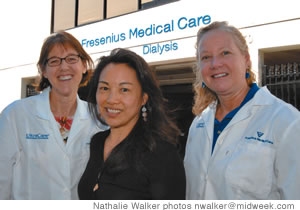Kidney Disease Awareness
Interviewed by Melissa Moniz
Wednesday - March 10, 2010
E-mail this story | Print this page | Comments (0) | Archive
 Del.icio.us Share
Del.icio.us Share

Dr. Ramona Wong
Nephrologist
What is chronic kidney disease?
It’s a silent, chronic disease that results from scarring of the kidney tissue from a variety of causes. As the kidney is damaged and permanently scarred, it loses function. One of its main functions is to clean the blood of excess waste, water and salt. Additionally, when you develop kidney disease, there is frequently blood vessel disease throughout the rest of your body including your heart, brain and limbs, increasing your risk of heart attack, stroke and peripheral artery disease (PAD). So it’s not just all about kidney; your whole vascular tree is at risk.
Hawaii has one of the highest rates of end-stage renal (kidney) failure (ESRD) in the nation. We have to do better than this.
What are the early symptoms?
Usually there is none. It’s a silent disease, so increasing public awareness is probably the most important thing that we should be doing. You want to catch early. So if you have risk factors for CKD - diabetes, high blood pressure, heart disease, stroke or a family history of kidney disease - even though you feel perfectly fine you, should go and get checked.
During the late stages of CKD, you can develop swelling of the ankles, which means there’s too much salt in your body. You can become short of breath, lose your appetite, get nauseated, lose concentration, start to itch, have fatigue. Most symptoms of late-stage kidney disease are non-specific. CKD usually does not cause pain.
Can you discuss dialysis treatment and when that is used?
There are five stages of kidney diseases based on the glomerular filtration rate (GFR), an estimate of how well your kidney filters waste from your blood. Labs report GFR if less than 60. GFR 30-60 percent, that’s stage 3. Then 15-30 percent is stage 4. And below 15 percent is stage 5. Dialysis is started in stage 5. Most patients, when referred to me, are afraid of dialysis, but really the greatest fear they should have is not being able to survive to dialysis, because many people in stage 3 do not survive to stage 4 due to increased cardiovascular events.

|
Can you explain how dialysis works?
Dialysis is a form of artificial life support that cleans the blood, since the damaged kidneys no longer can. There are two types of dialysis: hemodialysis and peritoneal dialysis. Hemodialysis is a method of filtering the blood that requires a fistula to get access to the patient’s blood. Fistula creation is a low-risk, outpatient surgery that connects an artery to a vein, and is advised when your GFR is 20 because it takes months before ready to use. To do dialysis, two needles are placed into the fistula, allowing dirty blood to flow out of the fistula through a filter that uses a concentration gradient principle, then cleaned blood flows back to the patient. Hemodialysis can be done at home or in a dialysis center.
The other form of dialysis, peritoneal dialysis (PD), which is done in the home daily, with no needles, is painless. PD uses your own belly cavity to filter wastes from your blood. The space between your belly wall and your intestines - that’s the peritoneal cavity. To prepare for PD, a small plastic tube (PD catheter) is surgically placed through your abdominal wall, so that one end of the tube is at the bottom of that peritoneal cavity and the other end is hanging out of your tummy. To dialyze, you’re well-trained to do what they call “exchanges” at home. An exchange is a 20-minute procedure using that PD catheter to drain out the fluid from your peritoneal cavity, then instill about two liters of specially formulated, sterile fluid or dialysate. After the exchange, you cap off your PD catheter, and while the dialysate is in your belly it pulls fluid and waste products from your blood vessels, so it filters your blood in your abdominal cavity.
Can you talk about the CKD clinic?
Fresenius Medical Care supports the only multidisciplinary CKD clinic in Hawaii staffed with a nurse practitioner, registered nurse, dietitian and social worker. With a referral from your doctor, CKD stage 3, 4 and 5 patients can benefit from a free series of classes, individualized nutrition counseling and CKD-specific monitoring to help the patient and doctor optimize their care.
For more information about the FMC CKD Clinic and its services, call 440-4893.
March is Kidney Awareness month. The National Kidney Foundation-Hawaii is hosting World Kidney Day March 11 from 11 a.m. to 4 p.m. at the State Capitol, a free event with food and entertainment.
E-mail this story | Print this page | Comments (0) | Archive
Most Recent Comment(s):













